Almost all major medical tests have particular prerequisites to obtain accurate results and minimize specific side effects. The same is the case for Magnetic Resonance Imaging which became commercially available in the 1980s and has been quite popular and beneficial since then. There are two significant kinds of MRI: MRI with contrast and MRI without contrast. Are you unaware of what they are, what to expect in an MRI scan, and what the prerequisites are? Let us help you.
What is Magnetic Resonance Imaging (MRI)?
Magnetic Resonance Imaging (MRI) is a painless and non-invasive scanning procedure that uses a large magnet and radio waves to form a detailed and multi-dimensional image of internal organs and structures. The radio waves used are not ionizing or potentially harmful, unlike X-rays and CT scans.
Since an MRI scan involves using strong magnetic fields, removing metal objects such as watches, jewelry, dentures (false teeth), piercings, hearing aids, and even wigs (some wigs contain small amounts of metal) is a compulsion.
Although the procedure's duration depends on the part of the body being scanned and the number of images taken, the process typically takes around 15 to 90 minutes. Unlike certain other procedures, there is no restriction on eating, drinking, and taking medications before the test. You don't need to fast unless expressly advised otherwise. It is common to have a questionnaire filled out by a patient before conducting the procedure to gain insight into their medical condition and history. A signed consent typically follows the filling of the questionnaire.
What is an MRI with Contrast?
MRI with and without contrast are the two significant kinds of MRI scans. The primary difference between the two lies in the use of a gadolinium-based contrast dye administered intravenously before the procedure.
An MRI with contrast involves the use of this dye, whereas an MRI without contrast does not. A contrast agent is used to obtain an intricately detailed look into a specific part of the body as the dye highlights inflamed areas, tumors, or any other abnormalities. Such anomalies absorb the stain and glow in return, allowing physicians to manipulate images for a better view.
This procedure can detect the smallest of tumors impossible to see even through an X-ray or CT scan. Therefore, an MRI with contrast provides more clarity into organs and tissues using an injectable dye.
What is an MRI without Contrast?
A contrast dye is not used in a non-contrast MRI. It is an excellent fit for obtaining vivid images of congested blood vessels, detecting aneurysms, and overseeing blood vessel activity. Various orthopedic studies are conducted via this procedure. There is typically no obligation for blood work in a non-contrast MRI.
An MRI without contrast is usually undertaken as a procedure for older people or patients with compromised kidneys. That is where a blood test comes into action; physicians necessitate it to gain insight into how well a patient's kidney functions and if it would be able to sustain the procedure. Such patients cannot flush out the dye from their bodies after the process, leading to certain connective tissue complications. The contrast dye can also cause tissue or organ damage in individuals suffering from severe kidney ailments. People on dialysis get dialysis immediately after a contrast MRI.
In some cases, the dosage of the dye is reduced to a sustainable amount. The contrast dye can also trigger some possible side effects, including dizziness, allergic reactions, shortness of breath, hives, flushing, blood clots, or aggravation of other conditions such as asthma, hypotension (lower than normal blood pressure), kidney ailments, anemia, and sickle cell disease.
It is recommended to seek immediate medical assistance if such symptoms appear. Although it is common for physicians to determine the kind of MRI scan a specific patient needs, patients also hold the authority to choose it independently. If you fear needles or are concerned about the blood work, take up your queries and concerns with your physician to work out a suitable plan of action.
The Importance of Blood Work before an MRI in case of Pregnancy
Blood work is a necessity in the case of a contrast MRI for pregnant women. Some blood samples are taken to detect pregnancy, whereas others determine if the use of gadolinium contrast should be limited and to what extent. The dye is only used in pregnancy if it can boost diagnostic performance and enhance fetal or maternal outcomes. However, the American College of Radiology (ACR) recommends that non-urgent MRI exams with gadolinium-based contrast agents should be avoided in pregnant women.
Do I need a Creatinine Blood Test before an MRI?
Certain patients are advised to have a creatinine blood test taken 30 days before an MRI examination. These patients include those aged 70 or older, insulin or non-insulin-dependent diabetic patients, and patients with a history of kidney masses, insufficiency, or those with a single kidney. You can quickly get a creatinine blood test done by experts at SmartClinix. Head over to their website right now and book your appointment!
References
Understanding MRI: basic MR physics for physicians - PubMed (nih.gov)- https://pubmed.ncbi.nlm.nih.gov/23223777/
Magnetic Resonance Imaging: Principles and Techniques: Lessons for Clinicians - PMC (nih.gov)- https://www.ncbi.nlm.nih.gov/pmc/articles/PMC4632105/
ACR guidance document on MR safe practices: 2013 - PubMed (nih.gov)- https://pubmed.ncbi.nlm.nih.gov/23345200/
Basic principles of magnetic resonance imaging - PubMed (nih.gov)- https://pubmed.ncbi.nlm.nih.gov/10555115/
Our clinical experts continually monitor the health and medical content posted on CURA4U, and we update our blogs and articles when new information becomes available. Last reviewed by Dr.Saad Zia on April 26th, 2023.












